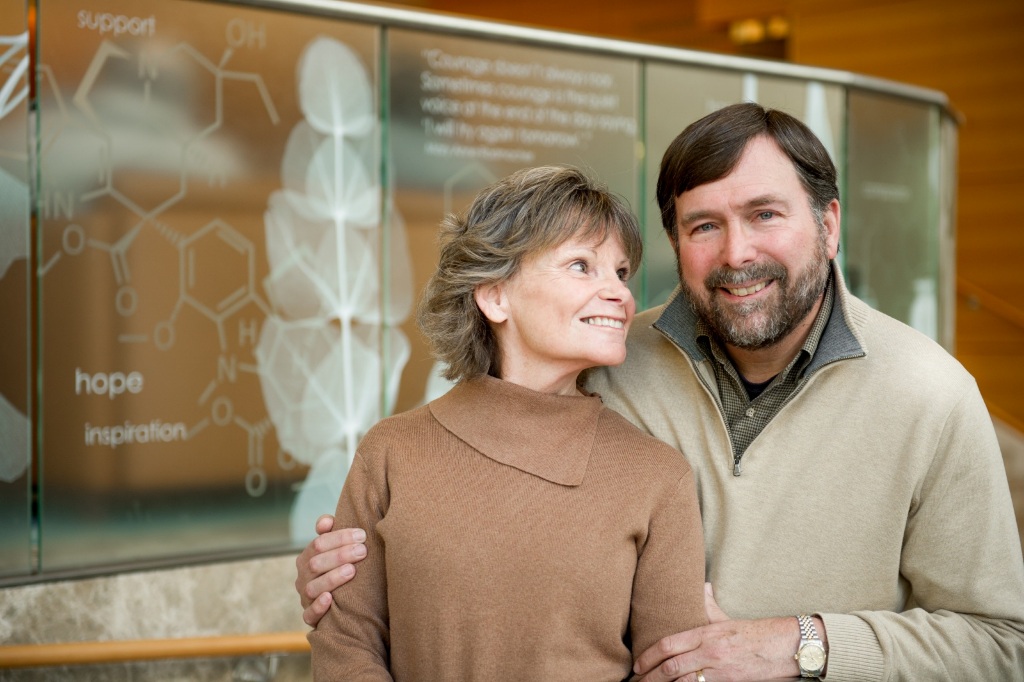
By Deb Osborne
On that beautiful day in October, filled with all the excitement life has to offer, I didn’t realize how important those words would become. Caught up in the wonderment of our wedding day, the magnitude of those words did not resonate with me until seven years ago when my husband was diagnosed with multiple myeloma.
Until you have actually experienced the overwhelming shock a diagnosis of cancer brings to an otherwise healthy person, I am not sure that you can truly understand the impact. Many people facing any of life’s challenges ask, “But why us?” I never asked that question. After all, cancer touches nearly everyone, so why should we be any different?
If it had been me with the cancer I could have dealt with it more easily. Finding out that the person I loved more than life itself had cancer was the biggest challenge of my life. I vividly remember silently wishing the situation were reversed.
Being a strong believer in the fact that life holds no guarantees I accepted the fact that my husband was the patient and I was, what is called in the cancer world, “the caregiver.” I remember hearing the word caregiver for the first time and thinking of it as a bit odd. I knew, as any grade school child can tell you, that the word caregiver is a compound word meaning one who gives care. But, in this whole new world of mine what did that actually mean?
When my husband’s medical team used the word, they made it sound almost like a vocation, much like a teacher or a firefighter. I felt as if I was holding the most important position in the world and I hadn’t even applied for the job. I began asking myself if there were qualifications. Obviously, I didn’t need a resume, but what exactly was my role? Was I qualified?
Read More:
I learned quickly that the role of a caregiver was not defined. There was no road map, no directions, no GPS that would take me from point A to point B, and certainly no one to tell me how long that journey would take. Instead I needed to figure out what my role in this journey would be. I needed to look at our relationship and contemplate what was most important for us. I needed to learn how best to be supportive without being controlling and how to be understanding and compassionate without being overly sympathetic. Finding the balance has not always been easy, and like any new job, I have stumbled along the way and learned from my mistakes.
I set out thinking that maybe in writing this post I could help provide tips for navigating the caregiver’s role, but as I think about conversations I have had with other people in similar situations, I realize that the role of caregiver is as varied as the diagnosis of cancer itself. There is no one size fits all. Each patient and each caregiver is uniquely different and consequently their needs are different.
Caregivers do have one significant thing in common that binds us tightly together: We continue to believe in the future, confident that a cure is not far away. So my advice – after seven years on the job – is to take one day at a time, do not become overwhelmed with what may come next, and simply keep on believing.
Reprinted from the Multiple Myeloma Research Foundation’s CoMMunity Gateway.

I am a breast cancer survivor of four years, and have heard those devastating words, “It’s stage 2 breast cancer”, “biopsy”, “mastectomy”, “chemotherapy”, “radiation”, “reconstruction”, “high-intensity pain killer drugs”, and on and on. I went through all of it, and as sick as I was, I tried to keep a good atitude, and with the constant loving care of my husband and one of my sons, I survived nine months of hell.
Now I am my husband’s caregiver, as he fights the battle everyday and for the rest of his life with a rare disease known as ANCA Vasculitis. This disease is not simple, but simply put, it inflames the veins and arteries and does not allow the blood to flow through, thus shutting down the major organs in his body. Without the proper drugs, you do not survive. After misdiagnosis from his primary care doctor, 10 days in a local hospital in isolation, and finally 5 days at MGH, he finally was diagnosed with this disease. Treatment was immediately begun, but he already suffered some loss of lung function and luckily not a lot of kidney damage. It could have been much worse. He was placed on a drug regiment of prednisone, methyltrexate, cylophophamide, and many more drugs to be taken daily, as well as chemotherapy given intravenously every 4/6 months. There is no cure, and he will have treatment for the rest of his life. As I watch hin suffer everyday from numerous, terrible effects of this disease, I feel totally helpless in being unable to do anything for him, my best friend, the man I love, and it has taken a big toll.
If you are a caregiver, know that you are not alone. We are the silent ones, who just deal with what comes our way. The reward, is having your loved one here with you and knowing that you are doing whatever you can to make his life a good one!